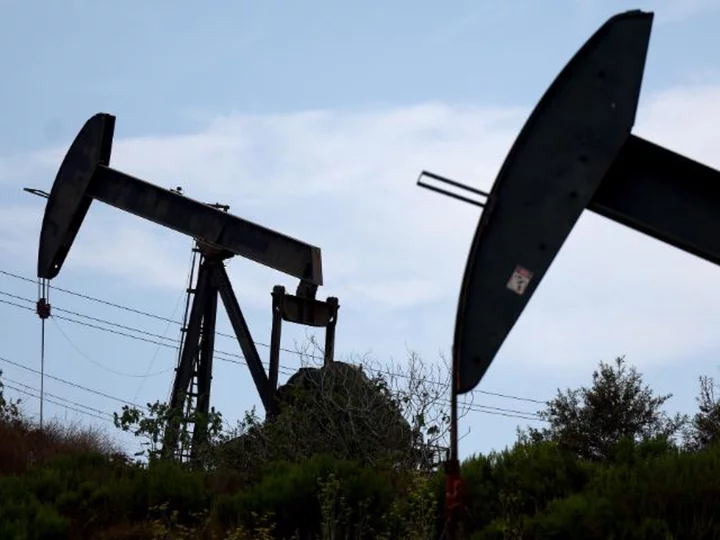Critics accuse President Joe Biden of waging a war on the oil industry that is hurting consumers at the gas pump. And yet, on his watch, US oil production is poised to shatter all-time records set during the Trump administration.
US oil output is now projected to rise to an average of 12.8 million barrels per day this year for the first time ever, according to federal estimates released Tuesday.
For context, that's about half a million barrels per day more than the prior annual record set in 2019. It's also more oil than any other country on the planet produces — the next-closest nation, Saudi Arabia, produces about 10 million barrels per day, according to OPEC.
The looming milestone undercuts the argument made by some 2024 GOP presidential contenders that the Biden administration is strangling the oil industry with red tape.
"There's a narrative out there that US production is dead or dying," said Hunter Kornfeind, oil market analyst at Rapidan Energy Group. But while its speed is slower than it used to be, it's "maturing, it's not dead," he said.
If anything, the outlook for US oil production has brightened recently -- in large part because oil prices have rebounded from recession fears and drillers have become more efficient.
The just-released 2023 production forecast from the US Energy Information Administration, or EIA, marks an upgrade of 200,000 barrels from its prior forecast. Next year, US oil output is projected to climb to another record of 13.1 million barrels per day.
Yet earlier this week, former Vice President Mike Pence vowed to turn back the "failed policies of the Biden administration" and to end "Joe Biden's war on energy." The 2024 presidential contender rolled out a new energy plan that includes allowing new drilling on federal lands, cutting permitting time in half and replenishing the Strategic Petroleum Reserve.
US oil output has increased since Pence and former President Trump left office -- a time when oil prices were low because of the Covid-19 emergency. The EIA expects US output to top 12.9 million barrels per day later this year. That would mark a 16% increase since January 2021 when Biden took office.
Domestic oil production similarly rose under former President Barack Obama as the US shale revolution took hold, unlocking vast amounts of oil and natural gas in Texas and elsewhere.
"It's perhaps less about the administration in power and more about the entrepreneurial nature of the oil industry," said Matt Smith, Kpler's lead oil analyst of the Americas.
Climate vs. inflation
When and if the oil production record falls, don't expect any fireworks from the White House.
The Biden administration has faced a delicate balance when it comes to the oil industry — which the president has, at times, blasted.
Last year, with gas prices spiking above $5 a gallon for the first time ever, Biden declared: "Exxon made more money than God last year."
On one hand, Biden ran the most aggressive climate campaign of any president in US history. Climate scientists say it's critical to slash planet-warming emissions from the fossil fuels industry and eventually wean the world off oil.
And yet this White House is especially sensitive to spikes in gas prices because voters view pump prices as a key economic barometer.
"Rising pump prices always terrify a sitting president because they hurt consumer confidence and the president's approval rating," Rapidan Energy Group wrote in a note to clients earlier this month.
"But the stakes are even higher now since rising oil prices threaten to blow the Fed's hoped-for 'soft landing' off course. It is hard to overstate how worried Team Biden is about rising oil prices."
Biden officials are aware that US oil companies must steadily increase supply to meet recovering demand.
That's especially true because Russia, Saudi Arabia and OPEC at large have held back barrels in a strategy aimed at boosting prices. Last week, Saudi Arabia vowed to extend its oil production cut for at least another month. Russia said it will slash oil exports by 300,000 barrels per day in September.
The American Petroleum Institute, an oil trade group that has been critical of the Biden administration's regulatory efforts, noted that approved federal permits and new federal acres leased have both fallen sharply under Biden.
"American oil and natural gas production is growing to meet rising demand, but that supply growth is largely from existing US projects approved in the 2010s," an API spokesperson said in a statement to CNN. "American producers are poised to do more to strengthen US energy security and support jobs and local economies, but we need the right policies from this administration to do it."
Gas price forecast ramped higher
That restraint from OPEC, along with extreme heat that sidelined refineries, has driven gasoline prices sharply higher. After months of mild prices, the national average for regular gas recently surged to nine-month highs.
The EIA isn't expecting dramatic relief anytime soon, calling for gas prices to average $3.63 a gallon through the end of the year. That's up sharply from its prior forecast of just $3.27 a gallon. The EIA also bumped up its projections for oil and diesel prices.
Of course, prices would be much higher without the support of domestic production. Recent output increases, along with ones likely on the way, should help cushion the blow for consumers.
It's also true that domestic oil production -— unlike prices -— has been slow to recover from the Covid-19 crash.
Analysts say that is largely because Wall Street has forced the notoriously boom-to-bust oil industry to instill a sense of financial discipline. Investors want the oil industry to focus on returning cash to shareholders, instead of spending lavishly on expensive drilling projects that may or may not pan out.
"The main driver of slower production growth since 2020 is investor sentiment, rather than the Biden administration knee-capping the industry," said Kornfeind, the Rapidan analyst.









